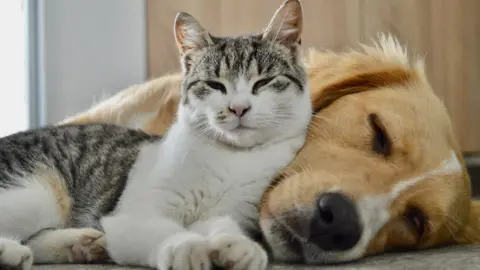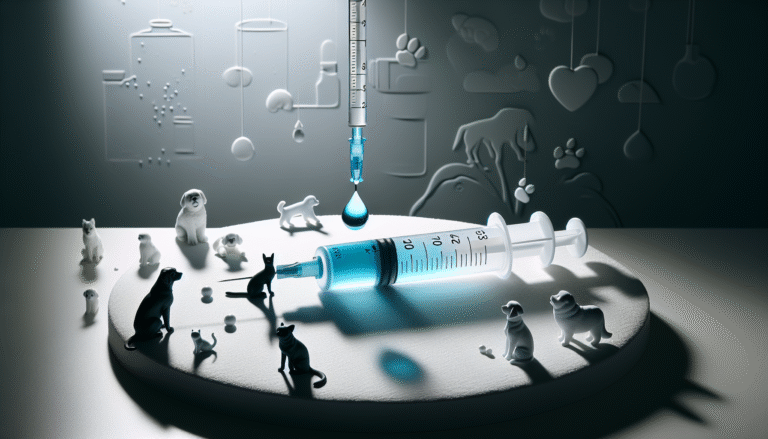Have you ever thought about what your pet’s waste could reveal about their health, or even about public health at large? The recent government study concerning dog and cat feces sheds some light on a pressing issue: the potential threat of superbugs.

This image is property of ichef.bbci.co.uk.
Why the Government is Interested in Pet Waste
The UK government is stepping up its efforts to understand the potential health risks associated with pet waste, particularly concerning superbugs—bacteria that have become resistant to common antibiotics. Did you know that over half of UK adults own at least one pet? This means many of you live in close quarters with your furry friends, increasing the risk of bacteria spreading both to animals and the humans who love them.
Understanding Superbugs
Superbugs are strains of bacteria that have adapted to survive treatments. They present a significant challenge to medical professionals since they resist the very antibiotics designed to eliminate them. The World Health Organization (WHO) has labeled antibiotic resistance as one of the most formidable public health threats of our time. Each year, over 1.2 million people die from drug-resistant infections, and this number could rise dramatically in the coming decades if no action is taken.
The Study’s Objectives
This groundbreaking study, set to run over four years under the supervision of Scotland’s Rural College, aims to gather and analyze fecal samples from healthy pets—not just those that might be sick. Prof. John Berezowski, a key researcher in this initiative, emphasizes that understanding how antimicrobial resistance is transmitted among pets will be crucial for public health strategies.
Monitoring Healthy Pets
You might wonder why the focus is on healthy pets. Many discussions around infections usually revolve around sick animals. However, the study aims to capture a broader picture of bacteria present in the general pet population. By including healthy pets, researchers can identify potential superbug carriers before they pose a risk to their owners.
The Mechanics of Transmission
You’re likely aware that close contact with pets can facilitate the transmission of various pathogens. The common act of petting your dog or cat, cuddling them, or handling their waste can create opportunities for bacteria to transfer. Research indicates that pets and people can potentially “swap” pathogens, including notorious hospital superbugs like MRSA (Methicillin-resistant Staphylococcus aureus).
Identifying Risk Factors
The study will not only identify which bacteria are present but also the circumstances that lead to their spread. Factors such as living conditions, hygiene practices, and the general health of pets will come into play. In a household setting, these bacteria can easily spill over from pet to owner, especially in shared living environments where maintaining strict hygiene protocols might be a challenge.
How Close Contact Matters
You interact with your pets daily, whether you’re playing with them, grooming, or simply being affectionate. Research suggests that such interactions can result in the transfer of bacteria, both harmful and harmless. It’s essential to be conscious of this, as in some cases, bacteria that seem harmless could evolve into something more serious.

This image is property of ichef.bbci.co.uk.
Hygiene Practices to Consider
If you’re a pet owner, practicing good hygiene is incredibly important. Experts recommend several straightforward practices to reduce the risk of transmitting harmful bacteria:
Frequent Handwashing
Always wash your hands after petting your dog or cat, especially before you eat or touch your face. This simple act goes a long way in preventing the spread of bacteria.
Careful Handling of Waste
When it comes to handling pet waste, use gloves whenever possible and always wash your hands afterward. Disposing of waste properly also helps limit the spread of bacteria.
Isolating Unwell Pets
If your pet shows signs of illness, consider isolating them in one room to prevent bacteria from spreading throughout your home. This precaution can keep the rest of your family safer, especially if there are young children or elderly family members who might be more vulnerable to infections.
The Bigger Picture of Antimicrobial Resistance
Understanding antimicrobial resistance isn’t just about pet owners and their animals; it’s broader than that. The very foundation of modern medicine relies on antibiotics. Without effective antibiotics, even simple surgeries could become high-risk procedures.
Implications for Medical Treatments
If superbugs continue to flourish, surgeries that we now consider routine—like caesarean sections or even removing an appendix—might become far more complicated. The stakes aren’t just your pet’s health; they encompass the broader health of our communities as well.
Global Concerns
In the larger context, antibiotic resistance poses a worldwide health crisis. Countries around the globe are facing similar challenges. The WHO warns that if no action is taken, drug-resistant infections could lead to an estimated 10 million annual deaths by the year 2050.

This image is property of ichef.bbci.co.uk.
The Role of Responsible Pet Ownership
As a pet owner, you have a role in minimizing the risk of superbugs. This responsibility isn’t merely about what happens in your home. Your actions can contribute to a larger movement aimed at combating antibiotic resistance.
Spaying and Neutering
Spaying and neutering your pets can help reduce health risks associated with infections and yer, contribute to the well-being of the pet population as a whole. This step not only supports your pet’s health but also helps lower the number of stray animals that may contribute to the spread of pathogens.
Regular Vet Check-ups
Regular veterinary visits play a crucial role in maintaining your pet’s health. During these check-ups, your veterinarian can screen for potential health issues, including any resistant bacteria that could pose a threat.
What This Study Means for You
This initiative to analyze dog and cat waste is not just an academic exercise; it has real implications for your health and the health of your family.
Participation in the Study
If you receive an invitation to participate in this study, consider taking part. Your contribution can help researchers understand pet health better and monitor potential threats more effectively.
Staying Informed
Keep abreast of findings from the study and other research into antimicrobial resistance. The more informed you are, the better equipped you’ll be to protect your family from potential health threats.

This image is property of ichef.bbci.co.uk.
Conclusion: Playing Your Part
The initiative to study pet waste is a vital step toward understanding and combating antimicrobial resistance. By recognizing the roles you and your pets play in this scenario, you can adopt practices that contribute positively to public health.
Final Thoughts
Engaging in responsible pet ownership and adhering to hygiene practices can help mitigate the risk of spreading harmful bacteria. As you embrace this journey with your furry companions, remember that informed actions can lead to healthier lives for both pets and owners alike. By participating in studies and keeping yourself informed, you’re actively contributing to a solution that could benefit not just your household but society as a whole.



